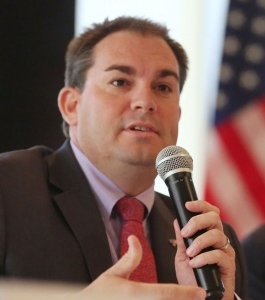Legislators zero in on agriculture
By Steve Herring
Published in News on August 24, 2018 5:50 AM

News-Argus/CASEY MOZINGO
Rep. Jimmy Dixon, R-Mount Olive, talks about the Farm Bill, as Rep. John Bell, R-Goldsboro, left, and Sen. Louis Pate, R-Mount Olive, listen during the legislative breakfast Thursday at Lane Tree Golf Club.

News-Argus/CASEY MOZINGO
Rep. John Bell, R-Goldsboro, speaks Thursday morning during the end-of-session legislative breakfast organized by the Wayne County Chamber of Commerce.
Wayne County's legislative delegation broke no new ground at Thursday morning's end-of-legislative session update breakfast, focusing instead on agriculture and the urban-rural divide.
Sponsored by the Wayne County Chamber of Commerce, the event was held at Lane Tree Golf Club and attended by Sen. Louis Pate, R-Mount Olive, Sen. Don Davis, D-Snow Hill, Rep. Jimmy Dixon, R-Mount Olive, and Rep. John Bell, R-Goldsboro.
Democratic Rep. Larry Bell was unable to attend.
Goldsboro News-Argus publisher Hal Tanner III, chairman of the Chamber's Government Affairs Committee, served as moderator.
It was the final official legislative breakfast for Davis and Dixon whose districts have changed and no longer include Wayne County. Both said they will continue to work for the county.
The legislators touched briefly on a variety of topics including the opioid crisis, the budget, teacher pay, low-wealth school funding and support of the military.
However, agriculture, which is the state's and Wayne County's largest industry, the Farm Bill and the urban-rural divide generated the most discussion.
The discussion was led in large part by Dixon, who is a farmer and chairman of the House Agriculture Committee and of the Appropriations, Agriculture and Natural and Economic Resources Committee.
"We made tremendous progress for the future as far as unnecessary, and in some instances, unethical lawsuits based on nuisance," Dixon said.
Each member of the local delegation voted to override Gov. Roy Cooper's veto of the Farm Bill that sets parameters on the suits, he said.
"So for us in eastern North Carolina, for people all over North Carolina, I think going forward I can't think of anything that I would classify as a greater success in the General Assembly than posturing us in the agricultural industry against the likelihood of future lawsuits that would be devastating to our economy," Dixon said.
Dixon said that Abraham Lincoln once questioned why politicians paid so much attention to farmers other than that farmers cast the most votes.
That is not true anymore, he said.
"But there is something that farmers still do -- they feed everybody who does vote," Dixon said. "I believe that over the past six years that the North Carolina General Assembly has become more friendly and user friendly to the agricultural community than it had been before."
Bell praised Dixon as the House leader on agricultural issues.
Along with addressing nuisance lawsuits, the Farm Bill also has a provision that is beneficial to consumers, Bell said.
"It talks about how we define milk here in North Carolina, and in this country," he said. "There are products in stores now that say it is muscle milk or this kind of milk, and it is not milk.
"We have developed a compact with other states to actually follow federal law, which should be followed to define milk as what milk should be."
Regulatory reform in recent years also has been beneficial to agriculture, Bell said.
"Our agriculture community represents an $88 billion plus economic impact on the state of North Carolina," he said. "By far it is the largest economic impact that we have here in Wayne County."
Farmers around military bases also are tied to efforts to prevent development encroachment that could endanger a base's mission, Bell said.
"If our framers are forced off their farms and have to sell their land, we may end up with encroachment issues around our bases," he said. "If our farmers are forced off their farms, every single one of you would feel the impact. No matter what you do, you would feel that impact."
Redistricting is part of the urban-rural divide discussion because of demographic shifts, Davis said.
The fundamental question is what will keep young people in the area to get their education and remain here to live, he said.
"Then we have to provide meaningful opportunities for them," he said. "A lot of people are moving, and some, unfortunately, some can't wait to leave because of opportunities.
"We have to do a better job of creating opportunities here in eastern North Carolina for young people. It is time to plan for the next generation of entrepreneurs and leaders in eastern North Carolina."
"Rural-urban divide, look up here," Bell said. "The first thing you are going to see is representation. Sen. Davis mentioned that. Wayne County currently has two senators and three representatives.
"After November, you will have two House members and one senator. So half of our delegation is gone. For years, as long as I can remember, Wayne County had two congressmen. Now, we have one."
The area's representation will decline because of population trends, Bell said.
Wake and Mecklenburg counties combined have more representation than all of eastern North Carolina east of Interstate 95, and the state is growing every single day, he said.
"So your urban-rural divide is really affecting what we are doing," Bell said. "Remember here when we talk about transportation, we talk about connectivity, how we get from point A to point B, goods and services.
"Metropolitan areas, when they talk transportation, they talk about congestion. When we talk about school construction, we are not talking about building a new school every year. We are talking about trying to fix what we currently have. We have two schools in Wayne County built in the '20s."
So the issues are different in urban and rural communities, Bell said.
That includes agriculture because some people in Raleigh have never walked on a farm, he said.
Not only is the urban-rule divide a loss of representation, but the direction of the state budget and state policies could change because of it, too, Bell said.
That is why the local delegation has to work together, and has done so, while other delegations are marked by strife, he said.
"This delegation is totally dedicated to the total betterment of eastern North Carolina," Bell said. "Our representation is declining, and it is very scary."
The divide is one area where rural Democrats and Republicans must remain united, Dixon said.
They must do so to ensure that the non-urban areas have a seat at the decision-making table, he said.
"If we stay united as non-urban delegations, and this is not only the correct, morally correct thing to do, it is also the economically correct thing to do," Dixon said.
It is one of the most important issues being faced because it sets the stage where North Carolina and the region will go, Pate said.
